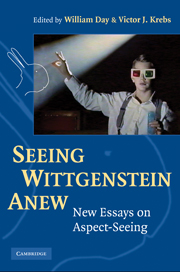Book contents
- Frontmatter
- Contents
- List of Contributors
- Acknowledgments
- Abbreviations of Wittgenstein's Works
- Seeing Wittgenstein Anew
- Introduction: Seeing Aspects in Wittgenstein
- I ASPECTS OF “SEEING-AS”
- 1 Aesthetic Analogies
- 2 Aspects, Sense, and Perception
- 3 An Allegory of Affinities
- 4 The Touch of Words
- II ASPECTS AND THE SELF
- III ASPECTS AND LANGUAGE
- IV ASPECTS AND METHOD
- Appendix: A Page Concordance for Unnumbered Remarks in Philosophical Investigations
- List of Works Cited
- Index
2 - Aspects, Sense, and Perception
Published online by Cambridge University Press: 05 June 2012
- Frontmatter
- Contents
- List of Contributors
- Acknowledgments
- Abbreviations of Wittgenstein's Works
- Seeing Wittgenstein Anew
- Introduction: Seeing Aspects in Wittgenstein
- I ASPECTS OF “SEEING-AS”
- 1 Aesthetic Analogies
- 2 Aspects, Sense, and Perception
- 3 An Allegory of Affinities
- 4 The Touch of Words
- II ASPECTS AND THE SELF
- III ASPECTS AND LANGUAGE
- IV ASPECTS AND METHOD
- Appendix: A Page Concordance for Unnumbered Remarks in Philosophical Investigations
- List of Works Cited
- Index
Summary
Contemporary interpretations of phenomenology, as well as current theories of perception, define perception (and seeing) in terms of sense: for example, in terms of a conceptualization set over against a brute perceptual given, which is a notion John McDowell has defined and criticized in Mind and World as the “Myth of the Given”. This idea is founded on the related idea of a sense immanent to perception, called a “noema.” This employment of the term “sense” has its roots, paradoxically, in a psychologizing reading of Frege; it also infects how we understand seeing-as in Wittgenstein. The question I want to ask, then, can be put simply: Is seeing (giving) a sense? Naturally I cannot pretend here to resolve the crucial question, central to much current philosophical discussion, of the connection of language to perception. My aim here is simply to bring out certain difficulties for the idea of perceptual sense, difficulties raised by Wittgenstein (and, along parallel lines, by Austin). These difficulties come from the specific point of view of ordinary language philosophy. Bringing out these difficulties will be the aim of my first two sections. In a third section, I will try to show how, in opposing the idea of perceptual sense, these criticisms at the same time constitute the emergence of something like a “linguistic phenomenology,” which, instead of adding sense to perception, can address the perception of the “phenomenon” of language as such, and thereby make possible a reconsideration of the notion of aspect.
Keywords
- Type
- Chapter
- Information
- Seeing Wittgenstein Anew , pp. 40 - 60Publisher: Cambridge University PressPrint publication year: 2010
- 2
- Cited by

